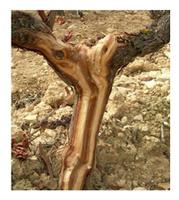
FungiGrapeMetaG

infected grapevine trunk
Metagenomic analysis of the microflora from infected grapevine trunk
Esca (black measles) and the diseases referred to as 'grapevine declines' are fungal pathogen-induced diseases of the grapevine trunk causing stunted growth, reduced yield, and ultimately, vinestock death. The main objective of this project is to perform an exhaustive analysis of microscopic microflora living in grapevine trunk by comparing asymptomatic grapevines and ESCA/ grapevine decline symptomatic grapevines to get a better understanding of these diseases.
This project is supported by several epidemiological and pathological studies performed in laboratories from INRA units UMR Santé Végétale (SV) and Ecophysiologie et Génomique Fonctionnelle de la Vigne (EGFV) from Bordeaux, France as well as professionnel agricultural institutes such as l’Institut Français de la Vigne et du Vin (IFVV). Wood samples from symptomatic or non symptomatic grapevines are currently analysed by classical microbiological methods as well as molecular methods (rDNA SSCP) to describe their microbiological diversity. After PCR amplification of selected genes from fungal and bacterial rDNA units, t
hese samples are currently analysed by high throughput sequencing using roche GS-Flex454 technology. Data are analysed using bioinformatics tools developed at URGI, Bioger and R-syst network, to describe the different fungal and bacterial species present in theses samples. In the second part of the project, gene expression analysis of infected grapevine trunk will be performed using high through put sequencing of cDNA from these different samples. As grapevine genome is now available, bioinformatics tools will be use to separate cDNA originating from grapevine from the those originating from other eukaryotes present in these samples (URGI, Bioger, URGV, EGFV). Thus metabolically active microbes will be identified. These results will allow a better description of the microflora present in a complex pathosystem such as ESCA/BDA disease, and ultimately identify the microbes responsible of these diseases
Duration: 01/08/2009 to 31/07/2012
Coordinator: Marc-Henri Lebrun, Alain Franc, Patrice Rey
- UMR BIOGER_CPP ; INRA-SPE, (Grignon) A. Gautier, V. Laval, MH Lebrun
- UMR 1065 Santé Végétale INRA / ENITA de Bordeaux (Bordeaux) J. Vallance, P. Rey
- UMR BioGeCo; INRA-EFPA (Bordeaux) A. franc
Project funded by
- INRA département SPE
- CASDAR (compte d'affectation spéciale développement agricole et rural)
Creation date: 09 Dec 2010
 eZ Publish
eZ PublishPublication supervisor: A-F. Adam-Blondon
Read Credits & General Terms of Use
Read How to cite








